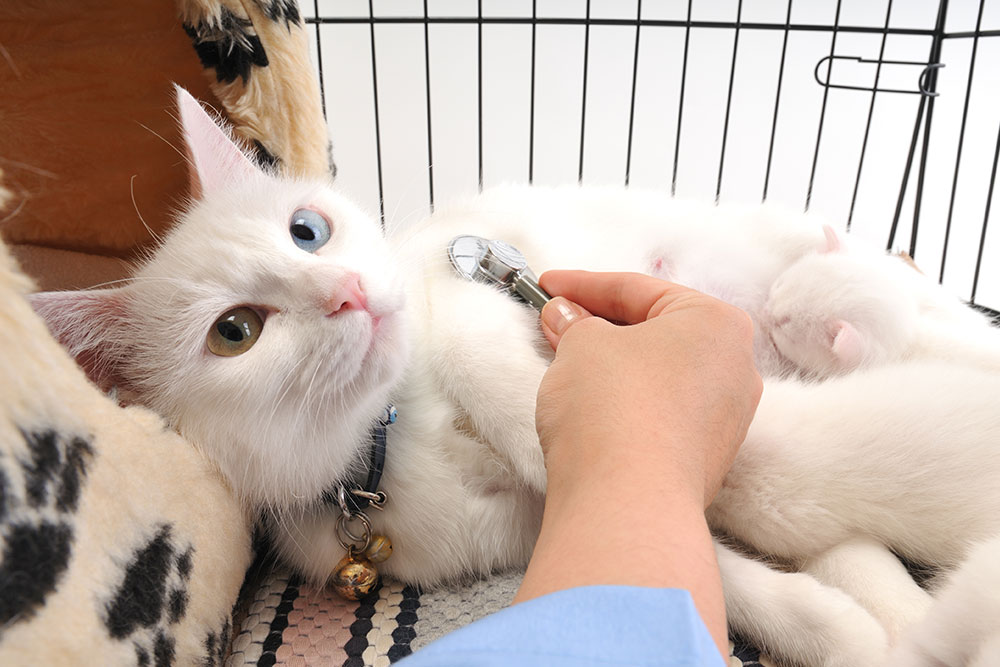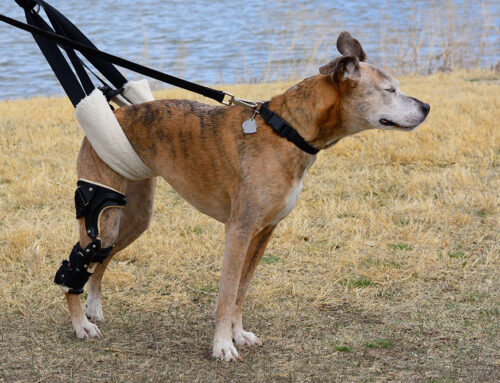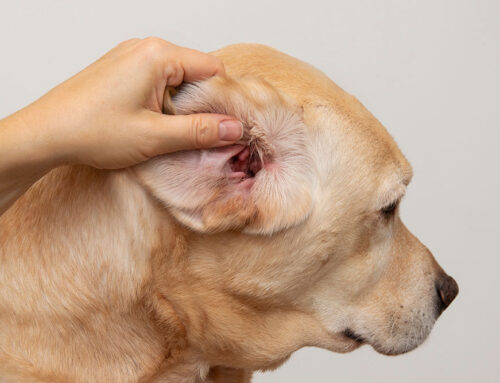Tiny Patients, Big Risks: Recognizing Emergencies in Puppies and Kittens
Puppies and kittens explore the world with curiosity- and zero sense of danger. A small accident, skipped meal, or bout of diarrhea can quickly escalate into a medical emergency. Their developing immune systems and tiny size make even minor illnesses life-threatening. Knowing when to act can save a young pet’s life.
At Animal Medical Center of Marquette, our AAHA-accredited and Fear Free certified team understands the vulnerabilities of young pets. Located in Michigan’s Upper Peninsula, we provide emergency care during business hours and advanced diagnostics to help puppies and kittens get urgent attention fast.
Why Young Pets Face Greater Health Risks
Puppies and kittens are not miniature adults. Their immune systems are immature, making infections that barely affect adults dangerous for them. Dehydration happens quickly due to their small size and high metabolism- a kitten can become critical after a few bouts of diarrhea, and a puppy may develop hypoglycemia after skipping just one or two meals.
Because their livers and kidneys are still developing, they also have a harder time processing toxins or medications. Even normal household items like toothpaste, onions, or pain relievers can lead to severe poisoning. And since they can’t regulate temperature well, they’re more likely to develop hypothermia or heat stress during environmental changes.
The rule of thumb: when in doubt, call your vet. Waiting can turn a mild issue into a crisis within hours. Even a pet who “seems fine” after an accident can worsen rapidly once adrenaline wears off.
When Breathing Becomes a Struggle
Respiratory distress is always an emergency. Young pets cannot compensate for low oxygen levels the way adults can.
Warning signs include:
- Open-mouth breathing or panting at rest
- Wheezing or raspy sounds
- Labored breathing or flared nostrils
- Blue or pale gums
Causes include congenital defects, pneumonia, or airway blockages. Kittens are prone to viral infections that clog airways, while puppies may choke on toys or debris. Some breeds are more at risk. Brachycephalic breeds (Bulldogs, Pugs) struggle with heat and airway issues. Understanding breed-specific health risks helps you prevent emergencies before they start.
If your pet is gasping or using their belly muscles to breathe, avoid stress or restraint and get to the veterinarian immediately- oxygen therapy, X-rays, or nebulized medications may be needed to stabilize them.
Vomiting and Diarrhea: Small Bodies, Big Consequences
Persistent vomiting or diarrhea can dehydrate a puppy or kitten within hours. Their small size means they have little fluid reserve, and electrolyte imbalances can lead to heart rhythm disturbances or organ failure.
Parvovirus in puppies is one of the most serious causes- this contagious virus causes severe bloody diarrhea, vomiting, and rapid dehydration. Without aggressive treatment, it can be fatal. Vaccination should start by 8 weeks of age and continue every 3-4 weeks until at least 16 weeks.
Foreign object ingestion, like eating strings, socks, or small toys, can block intestines, causing pain, drooling, and unproductive vomiting. These cases often require surgery to remove the obstruction and prevent perforation or sepsis.
Parasites like roundworms and hookworms are also common in young pets, leading to malnutrition, bloating, and anemia. Deworming schedules and fecal testing are vital for prevention, especially in recently adopted or outdoor-raised litters.
At home, never attempt to treat persistent vomiting with human medications. Many over-the-counter drugs are toxic to pets. Veterinary treatment focuses on rehydration, electrolyte balance, and addressing the underlying cause.
Seizures, Tremors, and Neurological Symptoms
Seizures, stumbling, or sudden collapse require immediate attention. Toxin exposure- such as antifreeze, rodent poison, or human medication- is a common cause. Trauma from falls or being stepped on can also trigger traumatic head injuries and neurological episodes.
Managing seizures may involve medication and monitoring to prevent brain damage. Some small-breed puppies can experience tremors from low blood sugar or calcium, which can look like a seizure but require different treatment.
If your pet seizes, move objects away but don’t restrain them. Note how long the episode lasts and go to your veterinarian as soon as it ends. Seizures lasting longer than five minutes or occurring back-to-back are life-threatening and demand emergency care.
Trauma: Falls, Bites, and Household Accidents
Curious young pets easily get injured- from falls, rough play, or getting stepped on. Even minor trauma can cause internal damage or fracture fragile, growing bones. Fractures near growth plates can affect how bones develop, leading to lifelong deformity if not stabilized correctly.
Electric cords are a common target for pets exploring the world with their mouths, which can result in electrocution. Burns inside the mouth, lung injury, or heart rhythm abnormalities may not appear immediately but can worsen over time.
Watch for: limping, swelling, pale gums, crying, or bleeding. Keep your pet still, apply gentle pressure to wounds, and seek veterinary care immediately.
After trauma, even if your pet seems alert, internal bleeding or organ rupture may develop hours later. Monitoring breathing rate, gum color, and energy level is essential until cleared by your vet.
Toxin Ingestion: Hidden Dangers Everywhere
Young pets chew everything. Common poisons include chocolate, grapes, onions, xylitol, human meds, cleaning supplies, and toxic plants like lilies and sago palms. Even brief exposure to essential oils, fertilizers, or household cleaners can cause vomiting, tremors, or collapse.
Prevent exposure by pet-proofing your home: secure medications, chemicals, and trash, and remove toxic plants.
If ingestion occurs, call ASPCA Poison Control and your vet. Never induce vomiting unless directed- some toxins, like corrosive cleaners, can cause more harm coming back up. Bring any packaging or plant samples to your appointment to guide treatment.
Weakness, Collapse, and Hypoglycemia
Sudden collapse is a critical emergency. Toy-breed puppies are especially prone to hypoglycemia after missing meals, and kittens can crash quickly if not eating. Other causes include anemia from parasites, heart defects, or infections.
Low blood sugar episodes often appear as wobbling, shaking, or unresponsiveness. Offering a small amount of sugar water or corn syrup may help while en route to the vet, but professional evaluation is always necessary to identify the cause and prevent recurrence.
Regular, frequent feeding and temperature control help prevent episodes in tiny or underweight pets. Any young animal too weak to stand, eat, or nurse needs immediate veterinary attention.
Eye Emergencies
Eye injuries are always urgent. Puppies and kittens stick their faces everywhere as they explore, which can have disastrous consequences. Scratches, infections, or trauma can cause redness, swelling, or discharge. Without prompt care, vision loss can occur.
You may notice your pet pawing at the eye, holding it shut, or showing sudden cloudiness. Avoid rinsing with tap water or using human drops- these can worsen the injury. Veterinary treatment may include topical antibiotics, pain relief, or protective collars to allow healing.
Should You Consider Pet Insurance?
Emergencies are costly, and young pets often face multiple health issues in their first year. Pet insurance provides peace of mind by covering diagnostics, hospitalization, and surgery, letting you focus on your pet’s recovery instead of finances. Many plans also cover preventive care, such as deworming and vaccines, helping you avoid some emergencies before they start. Enrolling early ensures coverage when your pet needs it most.
FAQs About Puppy and Kitten Emergencies
How fast should I respond to symptoms?
Immediately. Young pets deteriorate quickly- mild symptoms can turn severe within hours.
Can I give over-the-counter medication?
No. Many human medications are toxic. Always consult your veterinarian.
What’s normal behavior for a healthy puppy or kitten?
Healthy pets are playful, alert, and eager to eat. Sudden changes in behavior or appetite always warrant a veterinary check.
How can I prepare for an emergency?
Keep your vet’s number, an emergency hospital contact, and a pet first-aid kit accessible. Knowing where to go and what to bring can save valuable minutes during a crisis.

Protecting Your Youngest Family Members
Emergencies in puppies and kittens escalate fast, but recognizing warning signs and acting quickly saves lives. From breathing trouble to toxin ingestion, the team at Animal Medical Center of Marquette provides expert emergency care and advanced diagnostics to treat urgent conditions.
If your young pet shows concerning symptoms, don’t wait.
Call Animal Medical Center of Marquette or request an appointment today. When it comes to tiny patients, every minute matters.










Leave A Comment